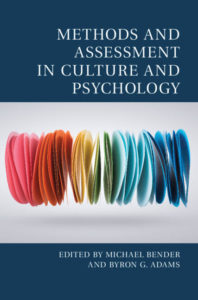Member Publications
Methods and Assessment in Culture and Psychology

Edited by Michael Bender and Byron Adams
Significant advancements in methodologies and statistical techniques in cross-cultural psychological research abound, but general practice, education, and most researchers in psychology rarely use them. This leads to misinterpretations, misrepresentations, and prejudice. The authors expertly demonstrate the importance of methodological rigor to safeguard appropriate inferences about similarities and differences, particularly when methods have not been developed in the cultural contexts where they are used.
The book features acculturation and identity, including contributions on remote acculturation, religiosity, and organizational contexts. It also covers individual differences and evaluates methodological progress in educational assessment, emotions, motivation, and personality. Methodological and psychometric perspectives on equivalence and bias, as well as measurement invariance in cross-cultural research, are a central theme. From study design to data interpretation, it is essential for psychology, and the social sciences in general, to adopt methods and assessment procedures that are more rigorous for culture-comparative studies.
- Explains that studying culture is an inherently methodological enterprise
- Highlights how methodological rigor is relevant across a wide area of inquiries, including acculturation, educational assessment, emotion, motivation, and personality
- Describes how empirical, cross-cultural investigations are grounded in qualitative, quantitative, and mixed-methods procedures, which are critical for test adaptation
- Argues that methodologically sound cross-cultural studies attending to equivalence, bias, and invariance testing must be included in psychological research
Publisher website: https://www.cambridge.org/nl/academic/subjects/psychology/cultural-psychology/methods-and-assessment-culture-and-psychology?format=PB
